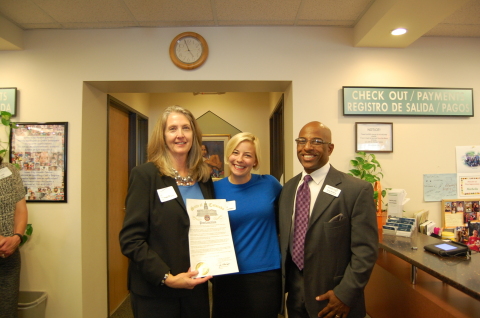AURORA, Colo.--(BUSINESS WIRE)--Public officials and community leaders, including those from Governor Hickenlooper’s staff, are getting a firsthand look at Colorado’s community safety net health care clinics, which provide quality health care services to hundreds of thousands of low income, vulnerable, at-risk Coloradans in urban and rural communities who are uninsured, underinsured or insured through public programs like Medicare, Medicaid or the subsidized health plans purchased through Connect for Health Colorado. Even though federal funding and enhanced reimbursement is largely unavailable to them, 89 Colorado Community Safety Net Clinics (CSNCs) and federally certified Rural Health Clinics (RHCs) provide essential health care to approximately 300,000 Coloradans who otherwise would not have access to essential care.
“With health care reform well underway, many more Coloradans are insured through Medicaid and by coverage purchased through Connect for Health Colorado. Yet even with these improvements there are significant barriers to health care access for many Coloradans that are attributed to type of coverage, language and cultural barriers, transportation challenges and geography. The clinics address health disparities by providing consistent, quality, culturally sensitive health care services regardless of a patient’s coverage or financial limitations. We hope community-by-community people come to know the clinics and providers that deliver health care services and work to enable healthy living for all Coloradans,” said Sharon Adams, Executive Director of ClinicNET, the organization representing Colorado’s community clinics, free and charitable clinics, hospital residency clinics and other safety net providers.
Michelle Milles, CEO of The Colorado Rural Health Center, said, “RHCs and CSNCs differ from other health care facilities in that they often receive little to no federal funding. Their funding streams can be volatile and uncertain due to many uncontrollable variables. We need the advocacy of each community to stand behind these clinics to ensure they remain viable.”
Helping address and expose these issues yesterday at Inner City Health Center in Denver, Katherine Blair of Governor Hickenlooper’s office presented an official State of Colorado Proclamation of Safety Net Clinic Week to ClinicNET and the Colorado Rural Health Center (see attached photo). Colorado’s Fifth Annual Safety Net Clinic Week runs August 18 – 22 and is supported by COPIC and Kaiser Permanente. Elected officials and candidates for office will be visiting clinics throughout the state August 18 - 22.
Colorado’s CSNCs and federally certified RHCs include 89 clinics located in 43 counties throughout Colorado. Annually, Colorado’s CSNCs and RHCs provide an estimated 878,000 visits to approximately 332,000 Coloradans, many in rural and underserved parts of our state. For more information or to learn more about Colorado’s safety net clinics, visit www.clinicnet.org or www.coruralhealth.org.
About ClinicNET
ClinicNET provides a collective voice for safety net clinics throughout Colorado. ClinicNET is committed to strengthening Colorado’s safety net by supporting Community Safety Net Clinics that provide health care to vulnerable populations. For more information about ClinicNET call 720-863-7800 or go to www.clinicnet.org.
About The Colorado Rural Health Center
The Colorado Rural Health Center (CRHC) is an independent, nonprofit, membership-based organization that serves as the State Office of Rural Health for Colorado. CRHC offers programs and services to ensure that rural communities have access to high quality health care services. For more on the Colorado Rural Health Center call 303-832-7493 or go to www.coruralhealth.org.

